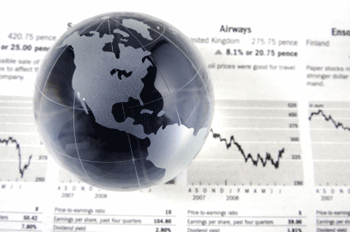 No shortage of options exists for students considering graduate-level business education, and the difference between a global finance MBA and a regular MBA is one of the top concerns as those students consider their options both at home and abroad. These two programs offer completely different perspectives on management and career choices, though many of their core curriculum requirements are identical or closely aligned. The primary differences between these programs include location, concentration, and future career paths either at home or in a global business setting.
No shortage of options exists for students considering graduate-level business education, and the difference between a global finance MBA and a regular MBA is one of the top concerns as those students consider their options both at home and abroad. These two programs offer completely different perspectives on management and career choices, though many of their core curriculum requirements are identical or closely aligned. The primary differences between these programs include location, concentration, and future career paths either at home or in a global business setting.
The Regular MBA: The Familiar Choice for Management of Domestic Businesses
The regular MBA, sometimes referred to as a professional, traditional, or even part-time MBA, is a program designed for students who intend to graduate and work within companies with an expanded domestic reach or a limited global presence. The program does not focus extensively on the international business community, nor does it necessarily prepare students for multinational management work. Instead, students are taught the fundamentals of all businesses, domestic and global, as they learn advanced but unifying management needs of all organizations.
They’ll learn accounting through the manager’s lens, universal marketing management skills for all businesses, and strategic management that can make it easier to manage a workforce no matter where the company is located. They will not learn about global regulations, global finance concerns, or the ethical requirements of managers who oversee overseas branches or multinational conglomerates. That’s where a Global Finance MBA program might offer a bit more wisdom and strategy to aspiring managers.
The Global Finance MBA: Offered Internationally, with a Global Business Focus
The Global Finance MBA is a program typically delivered by overseas university, primarily based in the United Kingdom. These universities offer both online and on-campus programs that teach students how finance works on a global scale. They’ll learn how to manage the finances of various company headquarters individually, based on local regulations, as well as globally, based on universal standards of financial management, accounting principles, and other common guidelines.
Global Finance MBA students will also get a virtually identical set of broad, management-focused courses in core content and departmental areas. This includes managerial marketing, accounting, finance, human resources, and strategic management. Most MBA students in this program will learn a significant about of information bout corporate ethics, data modeling, and decision-making as well, according to the Stern School of Business at NYU. The key differentiator is that the program’s concentration focuses on the global nature of finance and the responsibilities of the multinational finance manager when ensuring fiscally sound operation, ethically compliant financial disclosures, and expedient decision-making in this fast-paced setting.
Related Resources: Executive MBA
Two Great MBA Programs with Different Long-Term Implications
The graduate of a regular MBA program will be equipped for executive leadership in a domestic business, with context that relies mostly on American laws, ethical guidelines, and other considerations. The Global Finance MBA, by contrast, will learn more about the interaction of various countries’ financial policies and principles. They’ll learn the same core of management skills, but often with an international focus that will permit them to “close the gap” with regional and international outposts of the same company. For this reason, students considering one of these programs should understand that the major difference between a global finance MBA and a regular MBA lies in its focus on international norms, global financial management, and the best methods for running a business that does not stop its transactions at the national border.
